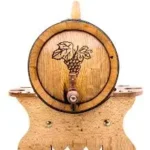We’ve all heard the saying, “Wine gets better with age.” It’s a romantic idea — bottles quietly resting in a cellar, becoming more refined and delicious as the years pass. But is it always true? Does every wine benefit from aging, or is it more myth than reality?
The answer is… it depends.
Why Some Wines Age Well
Wine is a living product — it changes over time due to chemical reactions between its acids, sugars, alcohol, and phenolic compounds (like tannins). In certain wines, these changes can create more complex aromas, smoother textures, and a deeper, more harmonious flavour.
Factors that make a wine suitable for aging include:
Tannin Structure – High tannins, often found in bold reds like Cabernet Sauvignon, act as a natural preservative.
Acidity – Wines with higher acidity age better, as the acid helps preserve freshness.
Sugar Content – Sweet wines, such as dessert wines, can age for decades due to sugar’s preservative qualities.
Balance – Wines with a perfect balance of fruit, acidity, tannin, and alcohol tend to mature gracefully.
When Aging Works Against You
Not all wines are built for the long haul. In fact, most wines today are designed to be enjoyed young, within a year or two of bottling. Aging a wine that isn’t structured for it can lead to disappointment — fruit flavours can fade, leaving a flat, dull taste.
Light, fruity wines like Beaujolais Nouveau, most rosés, and many inexpensive whites usually shine brightest when fresh.

The Sweet Spot for Aging
Even age-worthy wines have an optimal drinking window — that magical point where flavours are at their peak before they start to decline. For example:
Full-bodied reds: Often 5–15 years, depending on the style.
High-quality whites (like Chardonnay or Riesling): 3–10 years.
Fortified wines (like Port or Madeira): Decades or even centuries.
Cellaring Tips
If you plan to age wine, storage conditions are crucial:
Cool, stable temperature (ideally 12–15°C)
Humidity around 70% to protect corks
Darkness to prevent UV damage
Minimal vibration so the wine rests peacefully
So, Does Wine Really Get Better with Time?
For the right bottle, absolutely. A young, bold red can soften beautifully over a decade, and a fine sweet wine can develop extraordinary depth. But for most everyday wines, waiting years won’t improve them — you might be better off popping the cork and enjoying them now.
At the end of the day, the best wine is one that tastes great to you, whether it’s fresh from the winery or aged to perfection.
Want to Explore Our Wines.
OneGrape wines cover a wide range of tastes and occasions.
Visit our shop today to order your specially selected wines.


